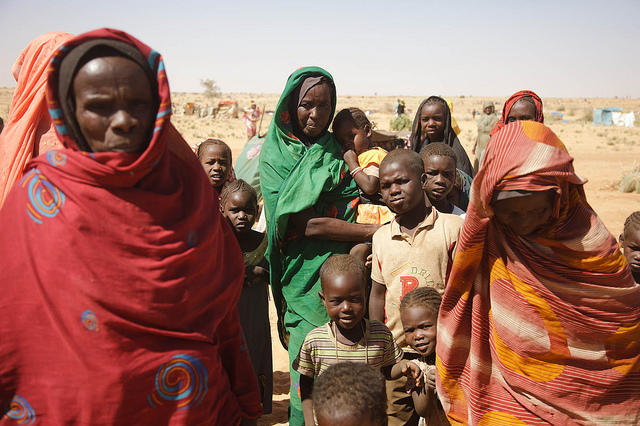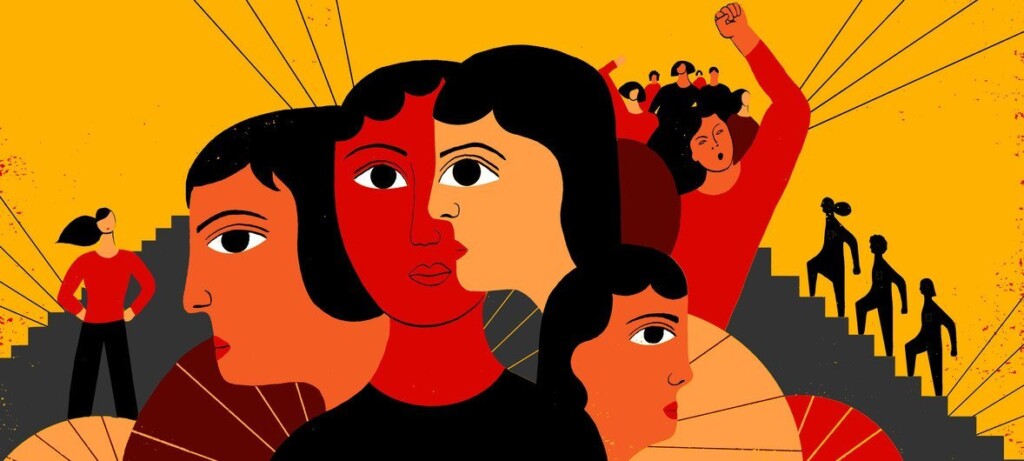WAR IS RAPE
Sudan Media Forum: ‘Women forced to trade sex for survival’

Displaced women and children in Zamzam camp near El Fasher, North Darfur (File photo: UNAMID)
Sudan Media Forum*: Joint Editorial Room
Prepared and edited by Sudan Tribune
As Sudan’s war continues to devastate lives, women are resorting to extreme measures to survive. Displacement, poverty, and the collapse of protective mechanisms have left many with no choice but to use their bodies to feed their families.
Salma El Taher, a pseudonym for a 20-year-old woman, fled South Kordofan with her family only to face further hardship in Khartoum. Her father was killed during the conflict in Kadugli in 2011. Years later, an airstrike in 2023 claimed her mother’s life as she worked selling tea to sustain the family.
“After my mother was killed, I found myself responsible for supporting and securing the lives of my brother and sister, without the ability to work that my mother did to feed us. I could only have sex with rapid support soldiers and other residents for money,” she continued.
Salma added that she earns little but persists to deter her 15-year-old brother from joining the paramilitary Rapid Support Forces (RSF). “I tell him I work in my mother’s place selling tea in the Central Market.”
Reports indicate the destruction of livelihoods in rural and urban areas has pushed families to extreme measures. These include marrying off girls to fighters in conflict zones and children joining armed groups in exchange for food.
‘Married off’
In El Fasher, the capital of North Darfur, aid workers from eight international organisations confirmed cases of girls being forced to marry fighters to survive.
Khaled Ibrahim, also using a pseudonym, shared his experience. After losing his job due to the conflict and fleeing to the Zamzam camp, he married off his 16-year-old daughter to a fighter.
“I used to sell vegetables in the El Fasher Market, but after the outbreak of war in the city as of May 10, 2024, I became unemployed.”, he states. With the continued artillery shelling, Ibrahim was forced to move to the Zamzam camp next to the city.
He explained that he married off his youngest daughter out of desperation. He said that he married the youngest of his girls to a fighter, due to his “inability to protect and feed her”.
Lack of protection
The director of Sudan’s Women and Child Protection Unit, Salimi Ishaq, acknowledged the exploitation linked to the ongoing conflict. “We expect this to happen in the war,” Salimi said. She explained that her unit is working to document cases of sexual exploitation and abuse, even in areas deemed safe.
She said that the Ministry of Interior issued decisions to establish offices in the states of Kassala, El Gedaref and White Nile, to increase protection mechanisms, stressing that women “do not report cases of exploitation in the absence of a mechanism to help them.”
Efforts are underway to form protection committees in shelters, train workers, and document violations.
The unit refrains from disclosing information about violations in RSF-controlled areas to protect residents from retaliation.
The United Nations and human rights organisations have accused the RSF of widespread sexual violence and exploitation, with numerous reports of rape and abuse emerging.
Volunteers in active conflict zones, including Khartoum and Darfur, are trying to provide food. However, restrictions by warring parties and limited resources leave many without help.
For millions trapped by the war, hunger, malnutrition, and exploitation are becoming daily realities as Sudan’s conflict grinds on.
UN Under-Secretary-General ‘ashamed of fellow men’ for sexual violence in Sudan

International Day for the Elimination of Violence Against Women, November 25 (Image: UNWomen)
“As a representative of the world coming to join you today and being welcomed by you today, I feel ashamed that we have not been able to protect you, and I feel ashamed of my fellow men for what they have done,” said Tom Fletcher, United Nations Under-Secretary-General for Humanitarian Affairs and Emergency Relief Coordinator, yesterday.
At a launch event at Algharbya School in Port Sudan for 16 Days of Activism against Gender-Based Violence (GBV), which began yesterday on the International Day for the Elimination of Violence Against Women, Fletcher lamented an “epidemic” of violence against girls and women in Sudan. He said it is “completely unacceptable” that one in three women worldwide has experienced sexual violence.
Fletcher is a former ambassador of the United Kingdom and policy adviser to three British Prime Ministers. He was appointed Under-Secretary-General last month and began his official duties on November 18. He is the 12th person to assume this role since the UN Office for the Coordination of Humanitarian Affairs (OCHA) was created.
“We must make sure that these words, ‘you are not alone,’ are not just words that people say into a microphone when they visit you, but they become the core of our work,” he said.
The Under-Secretary-General promised the crowd at the school that their voices would be the focus of the UN’s work, local organisations would receive more support in leading the response to GBV, and the UN would tell their stories to find more funding to respond to GBV in Sudan.
Fletcher ended his speech by calling upon his fellow men. “So for those men who are here supporting [victims of GBV], I salute that, and I say, where are the rest? Come and join us in this effort to support women and girls in standing up against sexual violence.
“For the men who are carrying out the sexual violence, I say: If you think you are doing this because you are strong, you are wrong. You are doing this because you are weak.”
As Sudan’s war continues to devastate lives, women are resorting to extreme measures to survive. Yesterday, Radio Dabanga reported that displacement, poverty, and the collapse of protective mechanisms have left many with no choice but to use their bodies to feed their families.
On Sunday, Swedish Ambassador and Special Envoy to Sudan, Anna Block Mazoyer, affirmed Sweden’s solidarity with Sudanese women who have been bearing the brunt of the ongoing humanitarian catastrophe. “The reports on Sudan indicate that sexual violence is being used systematically as a weapon of war,” she said.
As reported by Radio Dabanga in September, UN human rights experts expressed “their grave concern for the many documented cases of sexual abuse, rape (including gang rape), enforced prostitution, sexual slavery, kidnapping, enforced disappearances, and unlawful killings by the Rapid Support Forces (RSF) and other armed groups.
A report by the Strategic Initiative for Women in the Horn of Africa in late July documented over 250 cases of sexual violence across the country since the outbreak of the war, including 75 cases in El Gezira between December and April.
Both the Sudanese Army and the RSF have repeatedly denied that there is any structural campaign of GBV. While both belligerents have acknowledged the occurrence of “incidents”, the warring parties insist that these are isolated crimes attributable to “rogue individual elements”.
Consistent testimony from victims on the ground paints an entirely different picture. A recent report by the African Centre for Justice and Peace Studies amply corroborates “a pattern of harmful actions targeting Sudanese people based on gender, with women’s organisations documenting over 120 verified cases of rape as of October 2023, and fears that the actual number may be higher.”

This report was prepared in partnership with the Sudanese Media Forum’s member organisations.
No comments:
Post a Comment